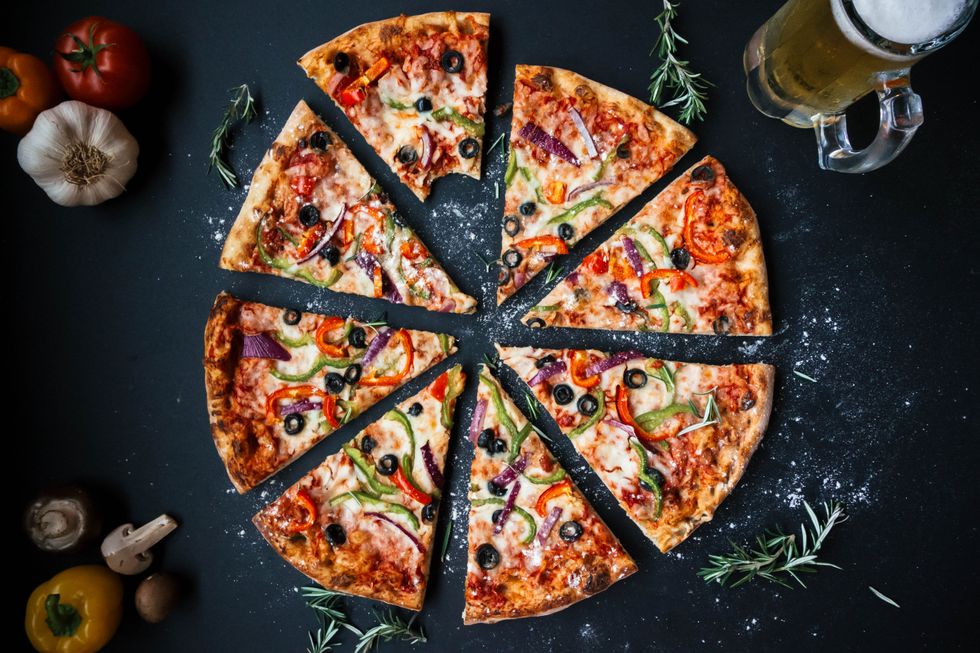I’ve had times when my body wanted pizza and McDonalds all day; I’ve had times when I almost cried over how good a taco salad was.
Our bodies want different things at different times, and that’s okay. Truly, food does not have moral value -- our body needs all of it! Like we say in Embody trainings, “an apple did not win the Nobel Peace Prize and a hamburger did not rob a bank.”
Believe me though, I know this is incredibly hard to drill in our minds, especially in a society that guilts us for eating certain foods. So many people say “I ate a salad today, I’m being so good" or "I ate three cookies, I’m doing so bad today.” Then comes along magazines and articles that tell us “when you want (insert “junk” food), you really just want (insert vegetable or nut), as well as days in a row when all we crave is “junk” food.
Remember this: different cravings mean we need different nutrients, and it’s okay if you choose the “fattier” option. We are not “good” or “bad” because of what we eat. We are not what we eat. We are also not, nor should we try to be, the food police for ourselves or others.
Food is fuel -- it’s simply something our bodies need so we can go be the fantastic friends, activists, students, family members, athletes and artists we are. This goes for our bodies as well -- they are simply a vessel for the love and hope we hold inside.
Also in Embody trainings, we love to share this quote by Ellyn Satter, a therapist and dietician:
“Normal eating is being able to eat when you are hungry and continue eating until you are satisfied. It is being able to choose the food you like and eat it and truly get enough of it -- not just stop eating because you think you should.
Normal eating is being able to use some moderate constraint in your food selection to get the right food, but not being so restrictive that you miss out on pleasurable foods. Normal eating is giving yourself permission to eat sometimes because you are happy, sad, or bord, or just because it feels good.
Normal eating is three meals a day, most of the time, but it can also be choosing to munch along. It is leaving some cookies on the plate because you know you can have some more tomorrow,or it is eating more now because they taste so goodwhen they are fresh.
Normal eating is overeating at times: feeling stuffed and uncomfortable. It is also undereating at times and wishing you had more. Normal eating is trusting your bodyto make up for your mistakes in eating. (Though we don’t like the word choice “mistakes” as eating a certain food isn’t one.)
Normal eating takes up some of your time and attention, but keeps its place as only one important area of your life.
In short, normal eating is flexible. It varies in response to your emotions, your schedule, your hunger, and your proximity to food."
Our bodies know what they need, so we should trust them. They will compensate for overeating and undereating. We don’t need some special juice cleanse -- that’s exactly what our livers are for!
Intuitive eating is incredibly hard. After struggling with food and body image, my hunger and satiety signals were messed up for some time, and I couldn’t tell if I was truly full or hungry or in between. I was scared to overeat; I was scared to undereat. But, to some degree, we all overeat and undereat sometimes -- and that’s normal.
Melissa Fabello is a great activist on this, and I love this post in which she reminds us that in the winter, our bodies need a little extra insulation to keep us warm. Craving and eating those fattier foods (remember, fat isn’t a bad word -- we need it to live!) is a natural, evolutionary part of the way our body works. It doesn’t mean we’re gluttonous or bad or lacking in self-control.
In another post, she reminds us that when we try to avoid our cravings or replace them with other foods, we end up just eating more food and eventually giving into the craving anyway. By listening to our body, we could’ve avoided a lot of superfluous behavior, guilt, and shame. In a sense, it really is just *that* easy.
With this conversation, we must also keep the Health at Every Size (HAES) movement in mind, realize what a fatphobic country we are, and think about how that affects people who live in bodies that take up more space. Some encourage eating disordered behavior in those people, feeling that somehow the behaviors aren’t disordered in them. Or, they don't allow those people to love and accept themselves. It’s sad, it’s harmful to recovery, and it stems from thin privilege.
My point in writing this is in hopes that we support ourselves and each other as people, not as food or as bodies. It's to remind us that it’s vital to listen to our body’s cravings. That our body will compensate and adjusts as it needs to, and that “normal eating” is actually a little different than you might think. We are not what we eat or how much we eat or how much space we take up.
We are allowed to (and should) eat in a way that adheres to our bodies' needs, no matter what size we are.
If you are struggling with disordered eating, you are not alone and help is out there for you! Feel free to check out www.nationaleatingdisorders.org for resources and information.

















